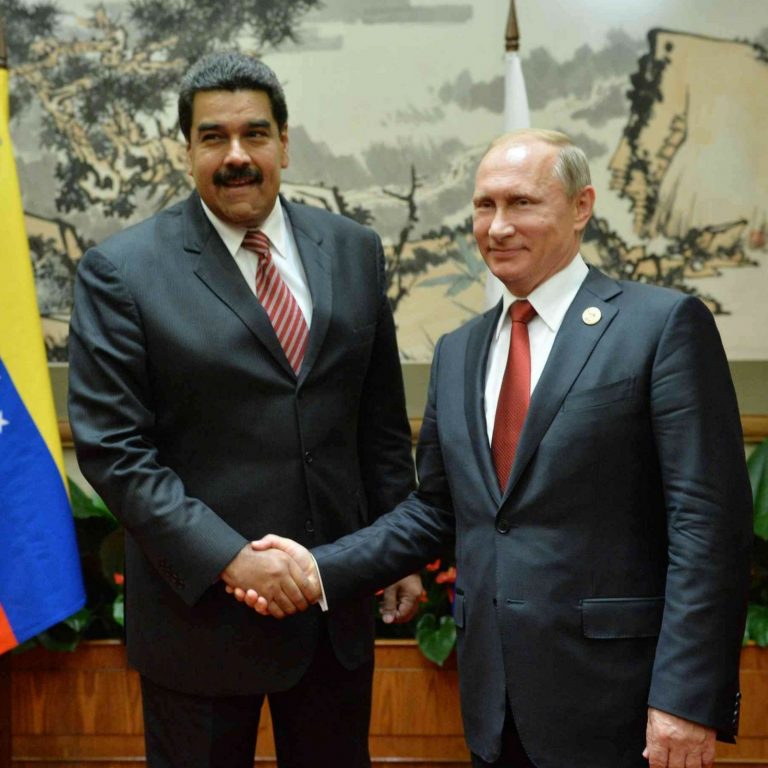Latest news about Bitcoin and all cryptocurrencies. Your daily crypto news habit.

A Time investigation into the development of Venezuela’s state-backed cryptocurrency, petro, revealed strong anecdotal and circumstantial evidence connecting Russia to its launch. At least two Russians with ties to Vladimir Putin were present at petro’s unveiling, complete with the Venezuelan president’s thanks. Analysts are claiming the South American country is Mr. Putin’s crypto guinea pig as the two nations try to find innovative ways around US sanctions.
Also read: Bitcoiners Demand More Crypto CFDs and Spread-Betting in the UK
Report Claims Putin and Maduro Teamed to Launch Petro
Time online is referring to Tuesday’s official sale of petro as “a half-hidden joint venture between Venezuelan and Russian officials and businessmen, whose aim was to erode the power of U.S. sanctions,” finding “Moscow’s fingerprints all over the creation of the petro.”
Such revelations come at an interesting time for all three countries. In the US, the present administration has been accused of being too close to re-elected Russian President Putin. Mr. Putin is under international pressure for alleged acts of assassination on foreign shores along with meddling in elections abroad. Venezuela has long been a client state of Russia, and has equally been the object of scorn for several US administrations. The three were tied together, somewhat unknowingly (on the US side at least) by President Trump’s recent Executive Order forbidding formal participation in the petro.
And truth be told it is Russia who would rather tread lightly at this point. Indeed, as Mr. Putin’s economic advisor, Igor Shuvalov, explained, “For Russia, it’s too dangerous. If we say that the only reason we do it is to avoid U.S. sanctions, then the United States is definitely going to be displeased about it. Venezuela has nothing to lose. For them it’s the only chance.” The Venezuelan economy is the daily subject of press accounts, documenting economic horrors.
So it might have seemed somewhat brazen to have no fewer than two Russian nationals connected front and center at petro’s media scrum launch last month. Denis Druzhkov and Fyodor Bogorodsky were thanked publicly by Mr. Maduro, and Mr. Bogorodsky stands at the one hour and eight minute mark to give a congratulatory speech in Russian (see video inset).
Covering Tracks on a Gamble
The two men were initially identified as representatives of a shadowy company, Aerotrading, which claims blockchain specialty. Within days of the presser, presumably to establish the company’s legitimacy, a sudden website and Twitter account were set up. Of the two men, Mr. Bogorodsky was the only to comment publicly.
Mr. Druzhkov is well connected to a Russian billionaire, while Mr. Bogorodsky is a former banking executive living in South America. The report describes him as having “close business ties with Russia and other former Soviet states.” It appears he’s been involved with petro since its inception late last year. Mr. Bogorodsky stresses, “Russia has been moving in this direction for a while now, trying to draft laws to regulate cryptocurrencies.” Venezuela’s pace has evidently been much quicker. Dismissing potential US concerns, he laughs, “Any citizen of the world can do what he wants. We offer freedom of choice. So I think there will be lots of investors, big and small, from all over the world.”
According to an anonymous “executive at a Russian state bank who deals with cryptocurrencies, senior advisers to the Kremlin have overseen the effort in Venezuela, and President Vladimir Putin signed off on it last year. ‘People close to Putin, they told him this is how to avoid the sanctions,’ says the executive. ‘This is how the whole thing started,’” the report explained. Russia is insisting it had nothing to do with the petro’s creation.
State apparatchiks, on the other hand, have made plenty of statements about US financial sanctions. The head of Russia’s second largest bank, VTB, Andrei Kostin spoke openly recently about how “The reign of the dollar must end. This whip that the Americans use in the form of the dollar would then, to a great extent, not have such a serious impact on the global financial system.”US regulators are quoted as not being too worried about petro nor the possibility of a crypto-ruble. It is hard to say if state-backed cryptocurrencies could ultimately work. Such ideas have always suffered from violating key tenants of crypto: censorship resistance and decentralization. By definition, state-backed currencies violate both.
Do you think state-backed crypto can work? Let us know in the comments!
Images via Pixabay, Wikipedia.
At news.Bitcoin.com we do not censor any comment content based on politics or personal opinions. So, please be patient. Your comment will be published.
The post Report Claims Putin Aided Maduro in Creating Venezuela’s Crypto, Petro appeared first on Bitcoin News.
Disclaimer
The views and opinions expressed in this article are solely those of the authors and do not reflect the views of Bitcoin Insider. Every investment and trading move involves risk - this is especially true for cryptocurrencies given their volatility. We strongly advise our readers to conduct their own research when making a decision.
